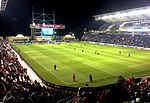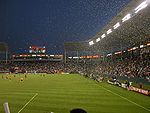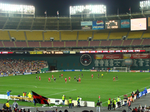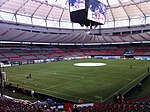
A | B | C | D | E | F | G | H | CH | I | J | K | L | M | N | O | P | Q | R | S | T | U | V | W | X | Y | Z | 0 | 1 | 2 | 3 | 4 | 5 | 6 | 7 | 8 | 9
| Season | 2014 |
|---|---|
| MLS Cup | LA Galaxy (5th title) |
| Supporters' Shield | Seattle Sounders FC (1st shield) |
| Champions League (U.S.) | LA Galaxy Seattle Sounders FC D.C. United Real Salt Lake |
| Champions League (Canada) | Vancouver Whitecaps FC |
| Matches played | 323 |
| Goals scored | 924 (2.86 per match) |
| Top goalscorer | Bradley Wright-Phillips (27 goals) |
| Biggest home win | LA 6–0 COL (Sept. 5) |
| Biggest away win | SJ 0–5 DAL (Aug. 16) |
| Highest scoring | 9 goals: NY 4–5 CHI (May 11) |
| Longest winning run | 5 matches: Seattle Sounders FC (Apr 12 – May 7) New England Revolution (Apr 26 – May 24) LA Galaxy (Aug 20 – Sept. 5) New England Revolution (Aug 23 – Sept. 13) |
| Longest unbeaten run | 12 matches: Real Salt Lake (Mar 8 – May 24) |
| Longest winless run | 13 matches: San Jose Earthquakes (Aug 2–present) |
| Longest losing run | 8 matches: New England Revolution (May 31 – Jul. 26) |
| Highest attendance | 64,207 POR @ SEA (July 13) |
| Lowest attendance | 3,702 POR @ CHV (May 28) |
| Average attendance | 19,148[1] |
← 2013 2015 → | |
The 2014 Major League Soccer season was the 19th season of Major League Soccer. It was also the 102nd season of FIFA-sanctioned soccer in the United States, and the 36th with a national first-division league.
The regular season began on March 8 and ended on October 26. The MLS Cup Playoffs began on October 29 and ended on December 7, when the LA Galaxy claimed their fifth league title by defeating the New England Revolution, 2–1, in MLS Cup
Teams, stadiums, and personnel
Schedule
Teams played 34 games: 17 at home and 17 away. The nine Western Conference teams faced each West club three times, with the home teams reversed from the previous year. The 10 Eastern Conference teams played 7 East teams three times (home teams reversed from 2013) and two East teams twice. Eastern and Western Conference teams played each other once, with the home team reversed from previous year.[2] 90 percent of matches were on weekends.[3] A proposal to cut the regular season to 28 matches and allow for balanced in-conference schedules was reported in the media but not adopted.[4]
Stadiums and locations
| Chicago Fire | Chivas USA/ | Colorado Rapids | Columbus Crew | D.C. United | FC Dallas |
|---|---|---|---|---|---|
| Toyota Park | StubHub Center | Dick's Sporting Goods Park | Crew Stadium | RFK Memorial Stadium | Toyota Stadium |
| Capacity: 20,000 | Capacity: 27,000 | Capacity: 18,086 | Capacity: 20,145 | Capacity: 19,467 | Capacity: 21,193 |

|

|

|

|

|

|
| Houston Dynamo | Montreal Impact | New England Revolution | New York Red Bulls | Philadelphia Union | Portland Timbers |
|---|---|---|---|---|---|
| BBVA Compass Stadium | Saputo Stadium[a] | Gillette Stadium | Red Bull Arena | PPL Park | Providence Park |
| Capacity: 22,000 | Capacity: 20,801 | Capacity: 22,385 | Capacity: 25,189 | Capacity: 18,500 | Capacity: 20,438 |

|

|

|

|

|

|
| Real Salt Lake | San Jose Earthquakes | Seattle Sounders FC | Sporting Kansas City | Toronto FC | Vancouver Whitecaps FC |
|---|---|---|---|---|---|
| Rio Tinto Stadium | Buck Shaw Stadium | CenturyLink Field | Sporting Park | BMO Field | BC Place |
| Capacity: 20,213 | Capacity: 11,500 | Capacity: 67,000 | Capacity: 18,467 | Capacity: 30,000 | Capacity: 21,000 |

|

|

|

|

|

|
Personnel and sponsorship
- On October 29, 2013, Real Salt Lake announced a 10-year contract with LifeVantage to become their jersey sponsor effective January 1, 2014. They replaced XanGo, which had been their sponsor since the 2006 season.[5]
- On February 10, 2014, Portland Timbers announced a partnership with Providence Health & Services to rename their stadium to Providence Park, which had been called JELD-WEN Field since 2011.[6]
- On February 24, 2014, D.C. United announced a multi-year jersey sponsorship with Leidos.[7]
- On May 1, 2014, Colorado Rapids announced a multi-year jersey sponsorship with Ciao Telecom.[8]
- On July 1, 2014, following two years without jersey sponsorship, Houston Dynamo announced a multi-year jersey sponsorship with BHP Billiton.[9]
Note: All teams use Adidas as kit manufacturer.
Player transfers
Major League Soccer employs twelve methods to acquire players. These mechanisms are the following: (a) via allocation; (b) via the Designated Player Rule; (c) via the annual SuperDraft; (d) via trade; (e) placing a discovery claim; (f) via the Homegrown Player Rule; (g) via the annual Re-Entry Draft; (h) via the annual Waiver Draft; (i) through weighted lottery; (j) through an "extreme hardship" call-up; (k) by replacing a player who has been placed on the Season Ending Injury List; (l) by replacing a player who has been placed on the Disabled List.[10]
Allocation ranking
The allocation ranking is the mechanism used to determine which MLS club has first priority to acquire a U.S. National Team player who signs with MLS after playing abroad, or a former MLS player who returns to the League after having gone to a club abroad for a transfer fee. The allocation rankings may also be used in the event two or more clubs file a request for the same player on the same day. The allocations will be ranked in reverse order of finish for the 2013 season, taking playoff performance into account.
Once the club uses its allocation ranking to acquire a player, it drops to the bottom of the list. A ranking can be traded, provided that part of the compensation received in return is another club's ranking. At all times, each club is assigned one ranking. The rankings reset at the end of each MLS League season.

